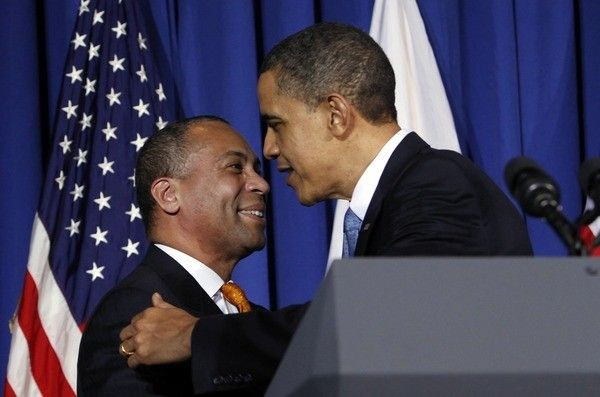Who Is Deval Patrick? Former Massachusetts Governor And Obama Friend Joins Race For Democratic Presidential Nomination

Former Massachusetts Gov. Deval Patrick announced Thursday he would join the crowded field vying for the 2020 Democratic presidential nomination, the second candidate this week to make moves to join the contest.
Former New York Mayor and billionaire Michael Bloomberg, who has yet to officially enter the race, said he has no plans to compete in the first four Democratic contests in Iowa, New Hampshire, Nevada or South Carolina. Instead, if he runs, he will concentrate on states holding contests on Super Tuesday, March 3, when more than a dozen states will stage balloting. He filed petitions this week to appear on the ballot in Arkansas. He also has filed for Alabama.
Patrick, 63, a two-term governor, announced his candidacy on a video then filed paperwork for the Feb. 11 New Hampshire primary. In the video, he said he decided to run for the people who “feel left out” but still want a future, adding that this election is about the “character of the country.”
https://twitter.com/DevalPatrick/status/1195030147063255040?s=20
Patrick, a close friend of former President Barack Obama, is closer to the ideological center than a number of members of the current field, including Sens. Elizabeth Warren and Bernie Sanders. Patrick said he’s opposed to Medicare-for-all but agrees with former Vice President Joe Biden and several others on the need for a public option for health insurance. Rather than a wealth tax, as proposed by Warren, he would push for a simpler tax code. He also opposes just wiping out student debt.
In an interview with the New York Times, Patrick drew distinctions between himself and the leading three contenders for the nomination, saying Biden’s appeal to return to normalcy is not enough and the Warren-Sanders approaches go too far to the left.
“Neither of those, it seems to me, seizes the moment to pull the nation together and bring some humility,” Patrick said.
Biden had been seen as the moderate choice for the nomination and the candidate best positioned to beat President Donald Trump. But other candidates have been chipping away at his lead in the polls, and his performance in a series of debates has left Democrats wondering if he can go the distance.
Patrick was raised by a single mother on the South Side of Chicago, and is a graduate of Harvard University and Harvard Law School. During his tenure as Massacusetts’ governor, he oversaw the implementation of the state’s healthcare reform program, which aimed to provide healthcare coverage for all state residents.
In other news, Kentucky Gov. Matt Bevins on Thursday finally conceded the Nov. 5 election, saying he’s not going to contest the results of the recanvass.
Bevins had been refusing to concede the election to Democrat Andy Beshear, currently the state’s attorney general, and instead had been claiming vote fraud without offering any evidence.
"I'm not gonna contest these numbers that have come in," Bevin told a Statehouse press conference. "It isn't fair to throw that on our Legislature to try to find something that there just isn't. We know of some things but just not enough to cause us to think there's gonna be meaningful change."
He added: "I truly wish the attorney general well as the next governor of this state as he assumes these responsibilities. I truly do.”
The recanvass showed Beshear won by 5,136 votes of more than 1.4 million cast, virtually identical to the total available election night.
© Copyright IBTimes 2024. All rights reserved.






















